Essay: Christian Social Thought Principles and Interrelationship
VerifiedAdded on 2023/06/08
|5
|1430
|397
Essay
AI Summary
This essay delves into the core principles of Christian social thought (CST), examining their impact on the interrelationship between the individual and the community. It begins by defining CST as a belief system rooted in justice, love, and peace, touching upon various aspects of life, including international development and family. The essay then explores five key principles: human dignity, emphasizing the inherent rights of all individuals; community and the common good, highlighting the importance of social needs and collective prosperity; option for the vulnerable and poor, advocating for the needs of the marginalized; participation, stressing the right to engage in societal life; and global solidarity, recognizing our interconnectedness. The essay concludes that CST's principles, especially the option for the vulnerable, provide a framework for a meaningful life and a just society. The essay uses various references to support the arguments.
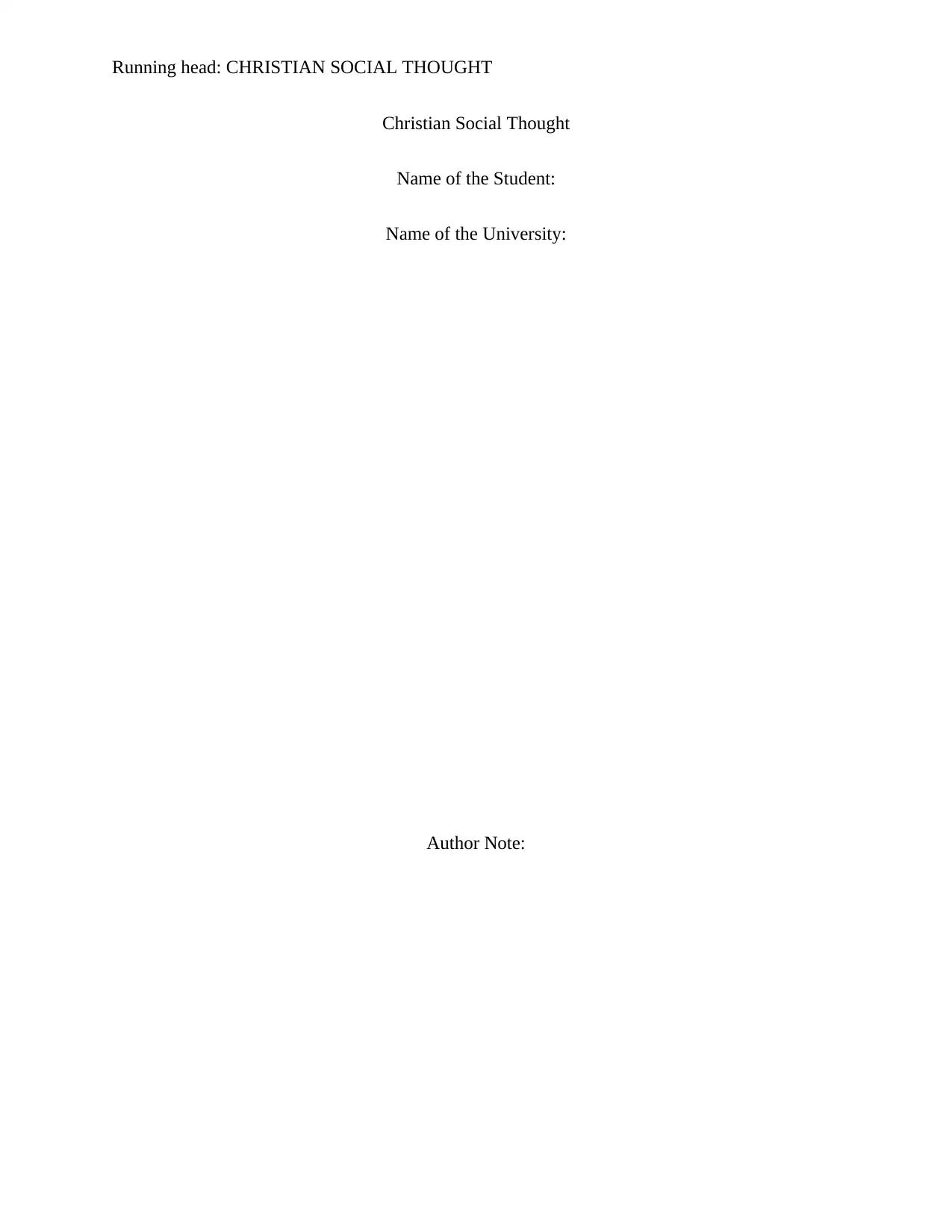
Running head: CHRISTIAN SOCIAL THOUGHT
Christian Social Thought
Name of the Student:
Name of the University:
Author Note:
Christian Social Thought
Name of the Student:
Name of the University:
Author Note:
Paraphrase This Document
Need a fresh take? Get an instant paraphrase of this document with our AI Paraphraser
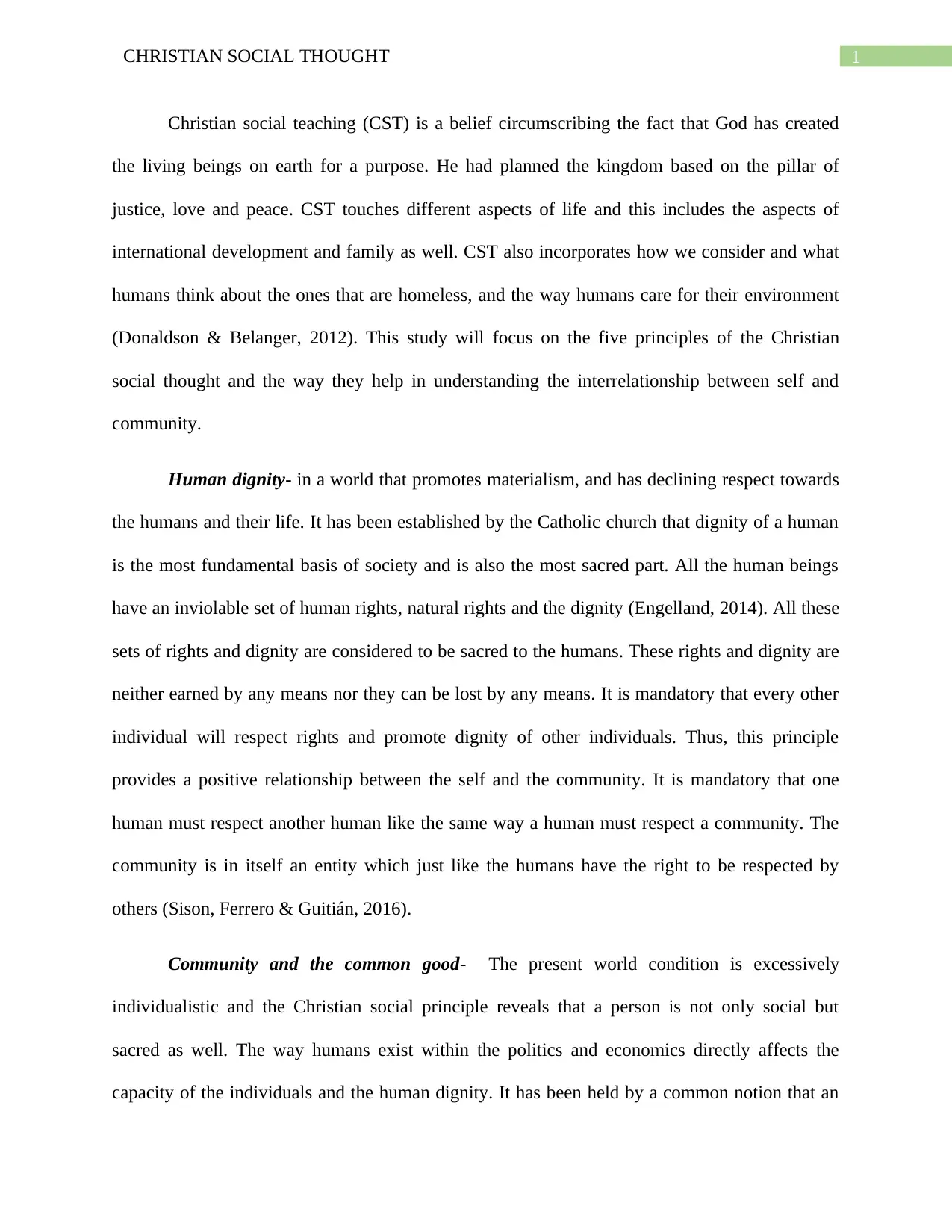
1CHRISTIAN SOCIAL THOUGHT
Christian social teaching (CST) is a belief circumscribing the fact that God has created
the living beings on earth for a purpose. He had planned the kingdom based on the pillar of
justice, love and peace. CST touches different aspects of life and this includes the aspects of
international development and family as well. CST also incorporates how we consider and what
humans think about the ones that are homeless, and the way humans care for their environment
(Donaldson & Belanger, 2012). This study will focus on the five principles of the Christian
social thought and the way they help in understanding the interrelationship between self and
community.
Human dignity- in a world that promotes materialism, and has declining respect towards
the humans and their life. It has been established by the Catholic church that dignity of a human
is the most fundamental basis of society and is also the most sacred part. All the human beings
have an inviolable set of human rights, natural rights and the dignity (Engelland, 2014). All these
sets of rights and dignity are considered to be sacred to the humans. These rights and dignity are
neither earned by any means nor they can be lost by any means. It is mandatory that every other
individual will respect rights and promote dignity of other individuals. Thus, this principle
provides a positive relationship between the self and the community. It is mandatory that one
human must respect another human like the same way a human must respect a community. The
community is in itself an entity which just like the humans have the right to be respected by
others (Sison, Ferrero & Guitián, 2016).
Community and the common good- The present world condition is excessively
individualistic and the Christian social principle reveals that a person is not only social but
sacred as well. The way humans exist within the politics and economics directly affects the
capacity of the individuals and the human dignity. It has been held by a common notion that an
Christian social teaching (CST) is a belief circumscribing the fact that God has created
the living beings on earth for a purpose. He had planned the kingdom based on the pillar of
justice, love and peace. CST touches different aspects of life and this includes the aspects of
international development and family as well. CST also incorporates how we consider and what
humans think about the ones that are homeless, and the way humans care for their environment
(Donaldson & Belanger, 2012). This study will focus on the five principles of the Christian
social thought and the way they help in understanding the interrelationship between self and
community.
Human dignity- in a world that promotes materialism, and has declining respect towards
the humans and their life. It has been established by the Catholic church that dignity of a human
is the most fundamental basis of society and is also the most sacred part. All the human beings
have an inviolable set of human rights, natural rights and the dignity (Engelland, 2014). All these
sets of rights and dignity are considered to be sacred to the humans. These rights and dignity are
neither earned by any means nor they can be lost by any means. It is mandatory that every other
individual will respect rights and promote dignity of other individuals. Thus, this principle
provides a positive relationship between the self and the community. It is mandatory that one
human must respect another human like the same way a human must respect a community. The
community is in itself an entity which just like the humans have the right to be respected by
others (Sison, Ferrero & Guitián, 2016).
Community and the common good- The present world condition is excessively
individualistic and the Christian social principle reveals that a person is not only social but
sacred as well. The way humans exist within the politics and economics directly affects the
capacity of the individuals and the human dignity. It has been held by a common notion that an
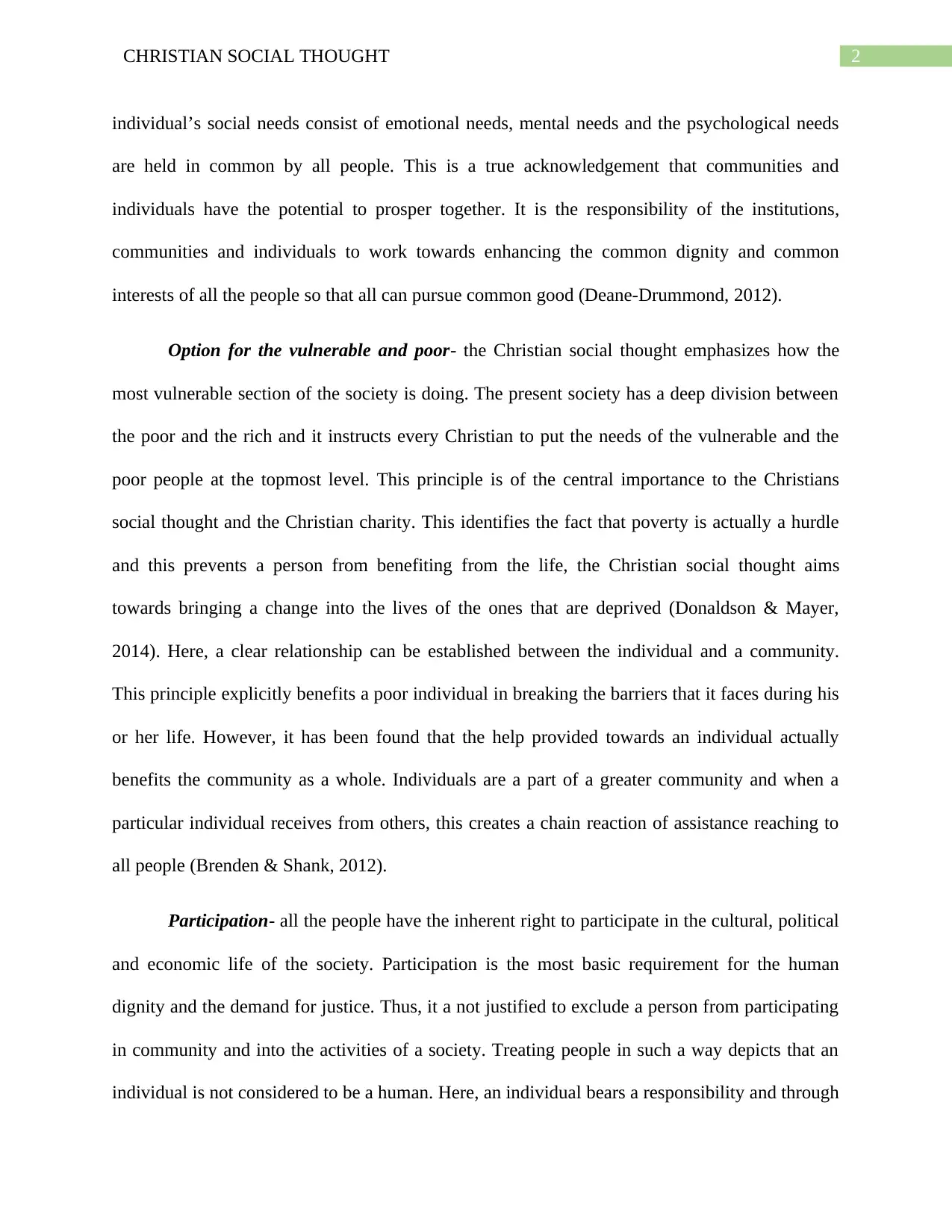
2CHRISTIAN SOCIAL THOUGHT
individual’s social needs consist of emotional needs, mental needs and the psychological needs
are held in common by all people. This is a true acknowledgement that communities and
individuals have the potential to prosper together. It is the responsibility of the institutions,
communities and individuals to work towards enhancing the common dignity and common
interests of all the people so that all can pursue common good (Deane‐Drummond, 2012).
Option for the vulnerable and poor- the Christian social thought emphasizes how the
most vulnerable section of the society is doing. The present society has a deep division between
the poor and the rich and it instructs every Christian to put the needs of the vulnerable and the
poor people at the topmost level. This principle is of the central importance to the Christians
social thought and the Christian charity. This identifies the fact that poverty is actually a hurdle
and this prevents a person from benefiting from the life, the Christian social thought aims
towards bringing a change into the lives of the ones that are deprived (Donaldson & Mayer,
2014). Here, a clear relationship can be established between the individual and a community.
This principle explicitly benefits a poor individual in breaking the barriers that it faces during his
or her life. However, it has been found that the help provided towards an individual actually
benefits the community as a whole. Individuals are a part of a greater community and when a
particular individual receives from others, this creates a chain reaction of assistance reaching to
all people (Brenden & Shank, 2012).
Participation- all the people have the inherent right to participate in the cultural, political
and economic life of the society. Participation is the most basic requirement for the human
dignity and the demand for justice. Thus, it a not justified to exclude a person from participating
in community and into the activities of a society. Treating people in such a way depicts that an
individual is not considered to be a human. Here, an individual bears a responsibility and through
individual’s social needs consist of emotional needs, mental needs and the psychological needs
are held in common by all people. This is a true acknowledgement that communities and
individuals have the potential to prosper together. It is the responsibility of the institutions,
communities and individuals to work towards enhancing the common dignity and common
interests of all the people so that all can pursue common good (Deane‐Drummond, 2012).
Option for the vulnerable and poor- the Christian social thought emphasizes how the
most vulnerable section of the society is doing. The present society has a deep division between
the poor and the rich and it instructs every Christian to put the needs of the vulnerable and the
poor people at the topmost level. This principle is of the central importance to the Christians
social thought and the Christian charity. This identifies the fact that poverty is actually a hurdle
and this prevents a person from benefiting from the life, the Christian social thought aims
towards bringing a change into the lives of the ones that are deprived (Donaldson & Mayer,
2014). Here, a clear relationship can be established between the individual and a community.
This principle explicitly benefits a poor individual in breaking the barriers that it faces during his
or her life. However, it has been found that the help provided towards an individual actually
benefits the community as a whole. Individuals are a part of a greater community and when a
particular individual receives from others, this creates a chain reaction of assistance reaching to
all people (Brenden & Shank, 2012).
Participation- all the people have the inherent right to participate in the cultural, political
and economic life of the society. Participation is the most basic requirement for the human
dignity and the demand for justice. Thus, it a not justified to exclude a person from participating
in community and into the activities of a society. Treating people in such a way depicts that an
individual is not considered to be a human. Here, an individual bears a responsibility and through
⊘ This is a preview!⊘
Do you want full access?
Subscribe today to unlock all pages.

Trusted by 1+ million students worldwide
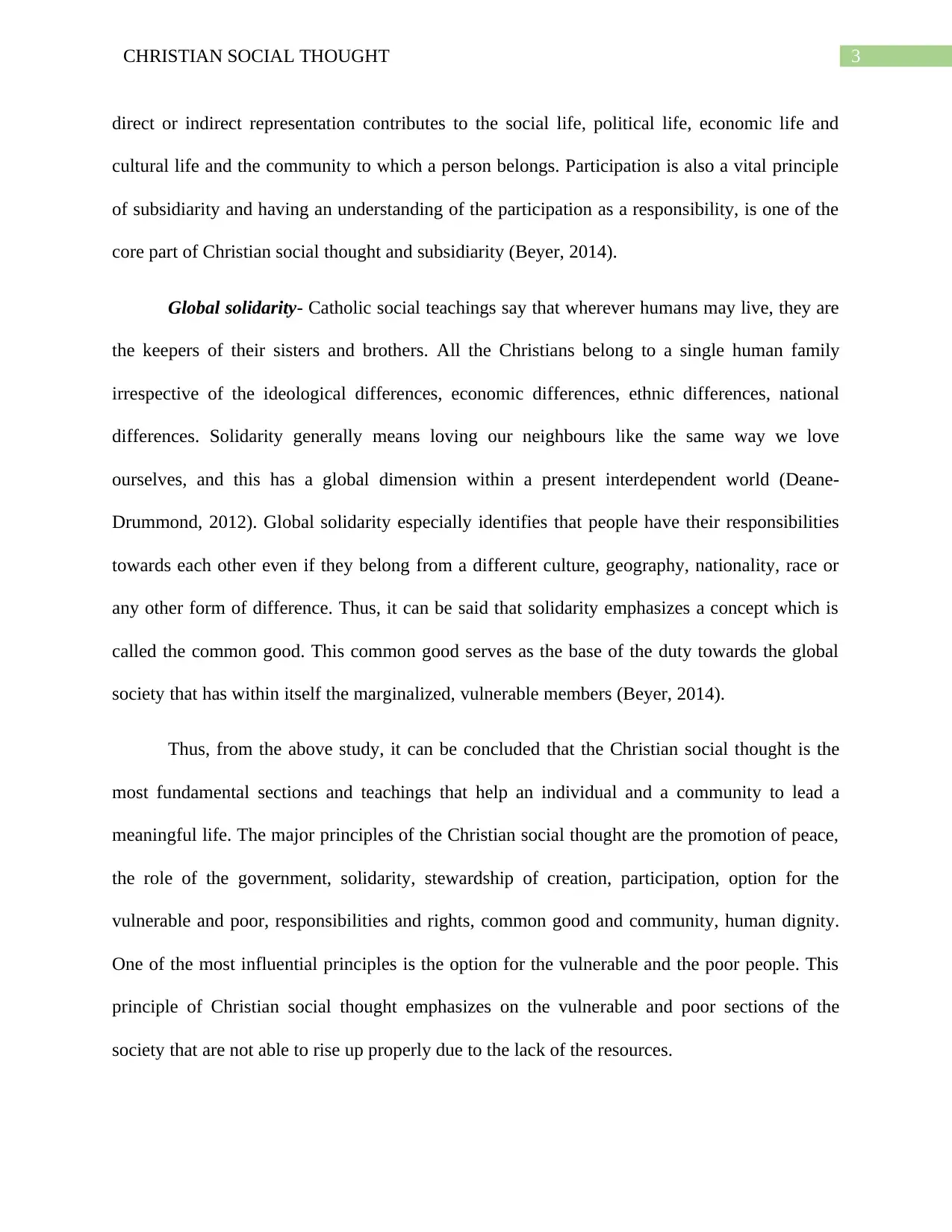
3CHRISTIAN SOCIAL THOUGHT
direct or indirect representation contributes to the social life, political life, economic life and
cultural life and the community to which a person belongs. Participation is also a vital principle
of subsidiarity and having an understanding of the participation as a responsibility, is one of the
core part of Christian social thought and subsidiarity (Beyer, 2014).
Global solidarity- Catholic social teachings say that wherever humans may live, they are
the keepers of their sisters and brothers. All the Christians belong to a single human family
irrespective of the ideological differences, economic differences, ethnic differences, national
differences. Solidarity generally means loving our neighbours like the same way we love
ourselves, and this has a global dimension within a present interdependent world (Deane‐
Drummond, 2012). Global solidarity especially identifies that people have their responsibilities
towards each other even if they belong from a different culture, geography, nationality, race or
any other form of difference. Thus, it can be said that solidarity emphasizes a concept which is
called the common good. This common good serves as the base of the duty towards the global
society that has within itself the marginalized, vulnerable members (Beyer, 2014).
Thus, from the above study, it can be concluded that the Christian social thought is the
most fundamental sections and teachings that help an individual and a community to lead a
meaningful life. The major principles of the Christian social thought are the promotion of peace,
the role of the government, solidarity, stewardship of creation, participation, option for the
vulnerable and poor, responsibilities and rights, common good and community, human dignity.
One of the most influential principles is the option for the vulnerable and the poor people. This
principle of Christian social thought emphasizes on the vulnerable and poor sections of the
society that are not able to rise up properly due to the lack of the resources.
direct or indirect representation contributes to the social life, political life, economic life and
cultural life and the community to which a person belongs. Participation is also a vital principle
of subsidiarity and having an understanding of the participation as a responsibility, is one of the
core part of Christian social thought and subsidiarity (Beyer, 2014).
Global solidarity- Catholic social teachings say that wherever humans may live, they are
the keepers of their sisters and brothers. All the Christians belong to a single human family
irrespective of the ideological differences, economic differences, ethnic differences, national
differences. Solidarity generally means loving our neighbours like the same way we love
ourselves, and this has a global dimension within a present interdependent world (Deane‐
Drummond, 2012). Global solidarity especially identifies that people have their responsibilities
towards each other even if they belong from a different culture, geography, nationality, race or
any other form of difference. Thus, it can be said that solidarity emphasizes a concept which is
called the common good. This common good serves as the base of the duty towards the global
society that has within itself the marginalized, vulnerable members (Beyer, 2014).
Thus, from the above study, it can be concluded that the Christian social thought is the
most fundamental sections and teachings that help an individual and a community to lead a
meaningful life. The major principles of the Christian social thought are the promotion of peace,
the role of the government, solidarity, stewardship of creation, participation, option for the
vulnerable and poor, responsibilities and rights, common good and community, human dignity.
One of the most influential principles is the option for the vulnerable and the poor people. This
principle of Christian social thought emphasizes on the vulnerable and poor sections of the
society that are not able to rise up properly due to the lack of the resources.
Paraphrase This Document
Need a fresh take? Get an instant paraphrase of this document with our AI Paraphraser
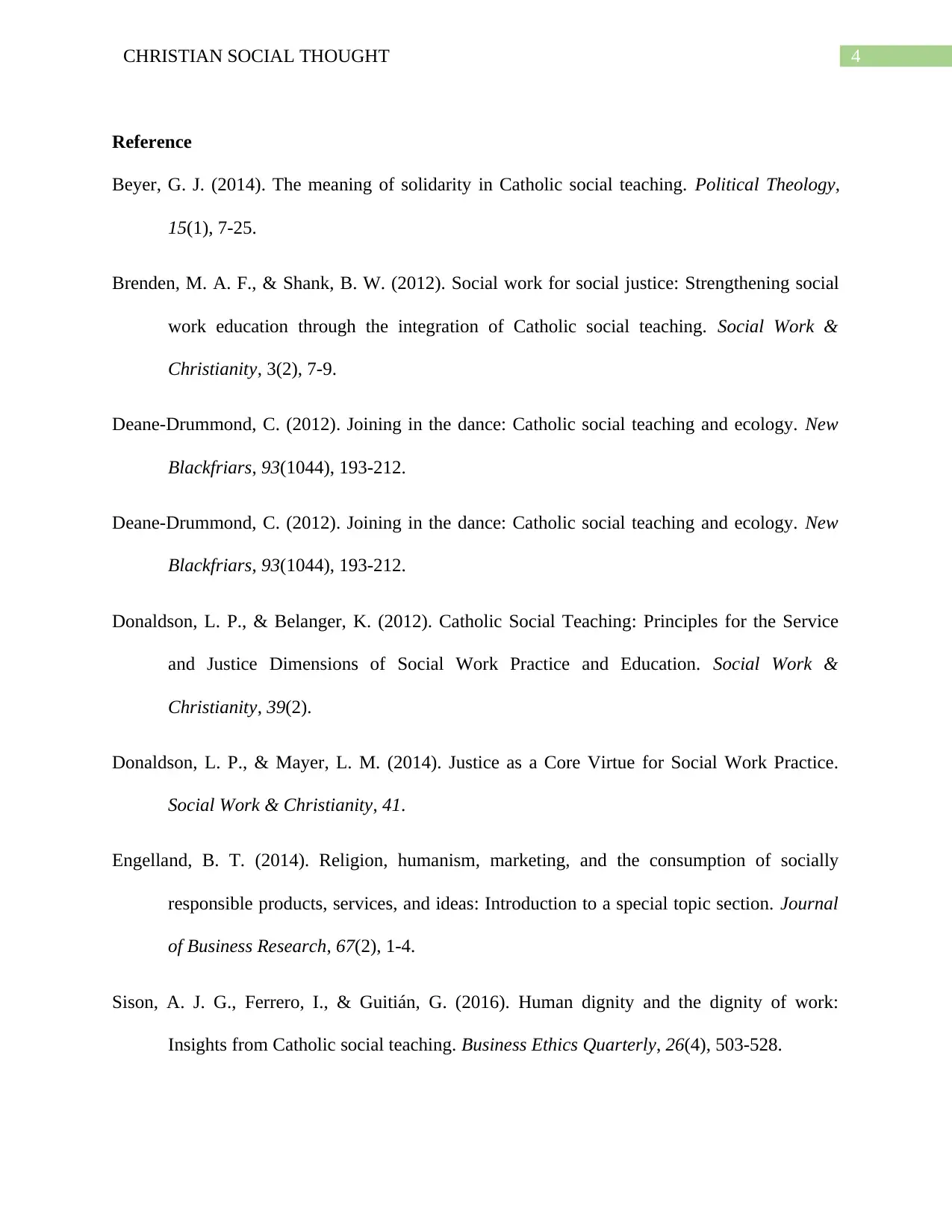
4CHRISTIAN SOCIAL THOUGHT
Reference
Beyer, G. J. (2014). The meaning of solidarity in Catholic social teaching. Political Theology,
15(1), 7-25.
Brenden, M. A. F., & Shank, B. W. (2012). Social work for social justice: Strengthening social
work education through the integration of Catholic social teaching. Social Work &
Christianity, 3(2), 7-9.
Deane‐Drummond, C. (2012). Joining in the dance: Catholic social teaching and ecology. New
Blackfriars, 93(1044), 193-212.
Deane‐Drummond, C. (2012). Joining in the dance: Catholic social teaching and ecology. New
Blackfriars, 93(1044), 193-212.
Donaldson, L. P., & Belanger, K. (2012). Catholic Social Teaching: Principles for the Service
and Justice Dimensions of Social Work Practice and Education. Social Work &
Christianity, 39(2).
Donaldson, L. P., & Mayer, L. M. (2014). Justice as a Core Virtue for Social Work Practice.
Social Work & Christianity, 41.
Engelland, B. T. (2014). Religion, humanism, marketing, and the consumption of socially
responsible products, services, and ideas: Introduction to a special topic section. Journal
of Business Research, 67(2), 1-4.
Sison, A. J. G., Ferrero, I., & Guitián, G. (2016). Human dignity and the dignity of work:
Insights from Catholic social teaching. Business Ethics Quarterly, 26(4), 503-528.
Reference
Beyer, G. J. (2014). The meaning of solidarity in Catholic social teaching. Political Theology,
15(1), 7-25.
Brenden, M. A. F., & Shank, B. W. (2012). Social work for social justice: Strengthening social
work education through the integration of Catholic social teaching. Social Work &
Christianity, 3(2), 7-9.
Deane‐Drummond, C. (2012). Joining in the dance: Catholic social teaching and ecology. New
Blackfriars, 93(1044), 193-212.
Deane‐Drummond, C. (2012). Joining in the dance: Catholic social teaching and ecology. New
Blackfriars, 93(1044), 193-212.
Donaldson, L. P., & Belanger, K. (2012). Catholic Social Teaching: Principles for the Service
and Justice Dimensions of Social Work Practice and Education. Social Work &
Christianity, 39(2).
Donaldson, L. P., & Mayer, L. M. (2014). Justice as a Core Virtue for Social Work Practice.
Social Work & Christianity, 41.
Engelland, B. T. (2014). Religion, humanism, marketing, and the consumption of socially
responsible products, services, and ideas: Introduction to a special topic section. Journal
of Business Research, 67(2), 1-4.
Sison, A. J. G., Ferrero, I., & Guitián, G. (2016). Human dignity and the dignity of work:
Insights from Catholic social teaching. Business Ethics Quarterly, 26(4), 503-528.
1 out of 5
Related Documents
Your All-in-One AI-Powered Toolkit for Academic Success.
+13062052269
info@desklib.com
Available 24*7 on WhatsApp / Email
![[object Object]](/_next/static/media/star-bottom.7253800d.svg)
Unlock your academic potential
Copyright © 2020–2026 A2Z Services. All Rights Reserved. Developed and managed by ZUCOL.




